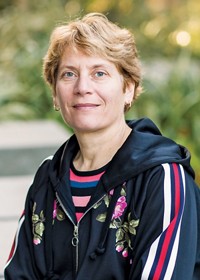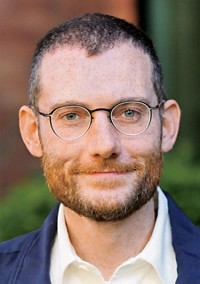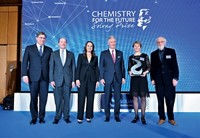Advertisement
Grab your lab coat. Let's get started
Welcome!
Welcome!
Create an account below to get 6 C&EN articles per month, receive newsletters and more - all free.
It seems this is your first time logging in online. Please enter the following information to continue.
As an ACS member you automatically get access to this site. All we need is few more details to create your reading experience.
Not you? Sign in with a different account.
Not you? Sign in with a different account.
ERROR 1
ERROR 1
ERROR 2
ERROR 2
ERROR 2
ERROR 2
ERROR 2
Password and Confirm password must match.
If you have an ACS member number, please enter it here so we can link this account to your membership. (optional)
ERROR 2
ACS values your privacy. By submitting your information, you are gaining access to C&EN and subscribing to our weekly newsletter. We use the information you provide to make your reading experience better, and we will never sell your data to third party members.
Awards
Bonnie Bassler, Carolyn Bertozzi, and Benjamin Cravatt receive 2022 Wolf Prize in Chemistry
Award recognizes innovation at the intersection of chemistry and biology, researchers say
by Jessica Marshall
February 9, 2022
| A version of this story appeared in
Volume 100, Issue 6

The 2022 Wolf Prize in Chemistry has been awarded to Bonnie L. Bassler of Princeton University, Carolyn R. Bertozzi of Stanford University, and Benjamin F. Cravatt III of Scripps Research in California. The three were given the award “for their seminal contributions to understanding the chemistry of cellular communication and inventing chemical methodologies to study the role of carbohydrates, lipids, and proteins in such biological processes,” according to the Wolf Foundation, which gives $100,000 prizes each year to a selection of people in the sciences and the arts.
With this award, the Wolf Foundation sends the message that “the chemistry-biology interface is a rich playing field in which to make discoveries,” Bertozzi says—a theme echoed by the other winners. “That’s what all three of us have in common,” she says.
Bassler agrees. The combination of scientists honored “highlights how intimately linked chemistry and biology are today, and how unexpected discoveries can be made using chemistry to probe biology and probing biological systems with the aim of revealing their underlying chemical principles,” she says in an email.
All three have developed unique scientific tools with which to make discoveries, Bertozzi adds. “It’s a theme that brings together a technology development with a biological discovery.”
Bassler’s research has identified the chemical signals passed to and from bacteria, often to indicate or hide their numbers, a phenomenon known as quorum sensing. Bertozzi is the founder of the field of bioorthogonal chemistry—conducting chemical reactions within cells while avoiding interference with the cells’ native biochemistry. She has also discovered that glycans play previously unknown roles as key cell-signaling molecules. Cravatt, meanwhile, has developed a suite of approaches, including chemical proteomics, for revealing what proteins are doing within cells and identifying novel drug targets for those proteins. The discoveries of all three researchers point to new possible ways to treat disease.
In comments to C&EN, all three researchers expressed their honor at receiving the award and their appreciation at sharing it with each other as longtime colleagues and friends. “Personally speaking, this award is a tribute to the many special members of our lab and their commitment to pursuing ambitious research problems at the interface of chemistry and biology with creativity, purpose, and persistence,” Cravatt says in an email.
The Wolf Prizes in the sciences are given to researchers in the fields of agriculture, chemistry, mathematics, medicine, and physics. Since the first prize in 1978, only one other woman, Ada Yonath of the Weizmann Institute of Science, has received the Wolf Prize in Chemistry before Bassler and Bertozzi.





Join the conversation
Contact the reporter
Submit a Letter to the Editor for publication
Engage with us on Twitter